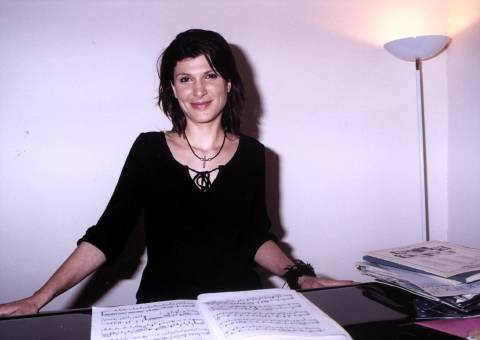|
 |
Musical sounds and colours
A portrait of the
Greek-born pianist
Eugenia Papadimas,
by BILL NEWMAN |
Beginnings
How old were you when you first had this great desire to play the piano?
'It was certainly before I went to school. What happened was that we always had my grandmother's piano at our home. I had a sister who was six years older than me. She had been having lessons but didn't like it, so when I was about three or four years of age I just sat down and started to play. I am speaking now of the sounds that I had heard her play. I imitated the sounds of familiar popular music, so my parents decided to send me to the local Athens Conservatory when I was too young to understand. They immediately accepted me as a candidate, but I hadn't yet learnt to read and write! They gave me the pentagram with seven different colours for seven notes: C was red, D was green, and so on. After the Conservatory, I went on to school where I was able to understand musical language before I could read the letters of words.'

Eugenia Papadimas
|
Philosophical understanding
Playing the piano, did this impart any knowledge to your subsequent studies, making them become easier?
'The study of music has an abstract element which is the score itself. But it also has this concrete element that commences when we first read it through, and leads through ultimately to the performance itself. As a pianist you contribute towards this by defining the meaning behind the music and giving character to your own performance. Naturally, what we call music is the combination of various frequencies, and understanding this fundamental fact at an elementary level advances a grasp of musical forms. At the same time, it furthers our appreciation for other subjects, like mathematics which involve a vigorous study of frequencies and oscillations.'
'Pythagoras, to whom all musicians owe a great intellectual debt of gratitude, is thought to be responsible for the invention of musical structure. The link between music and mathematics is straightforward, even if one doesn't understand its precise nature.'
You are a very receptive person with a quest for knowledge.
'I love knowledge and ask questions all the time. Whatever I am interested in I go for it because it is the joy of life.' The desire to make music and be worldly wise at the same time. 'Exactly. It cannot be one without the other. Realising that, its expression gives you a much wider perspective in what you want to say. You need to be behind the words and what goes on behind the score; I think it is the same thing'.
Continue >>
Copyright © 5 December 2004
Bill Newman, Edgware UK

| 
